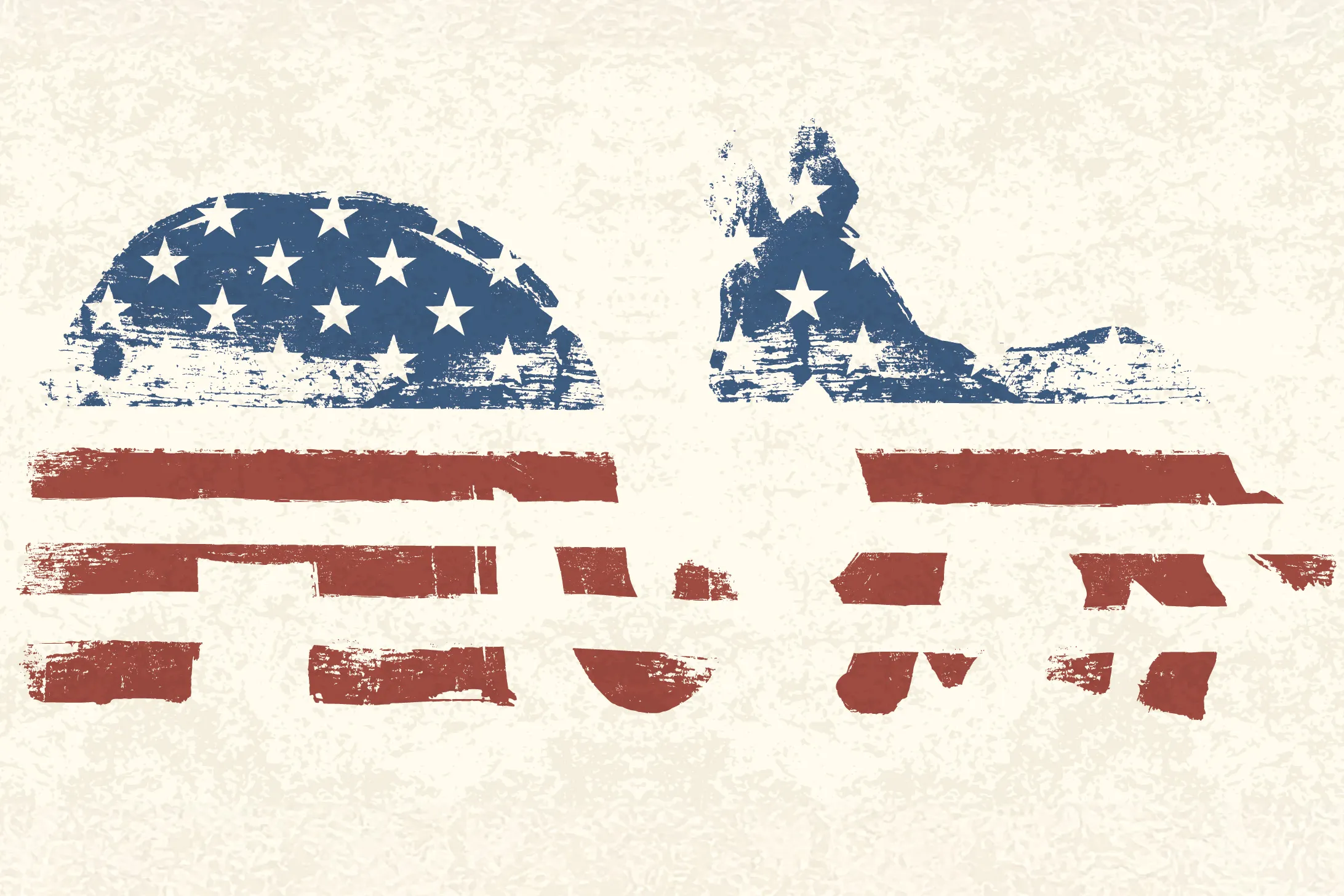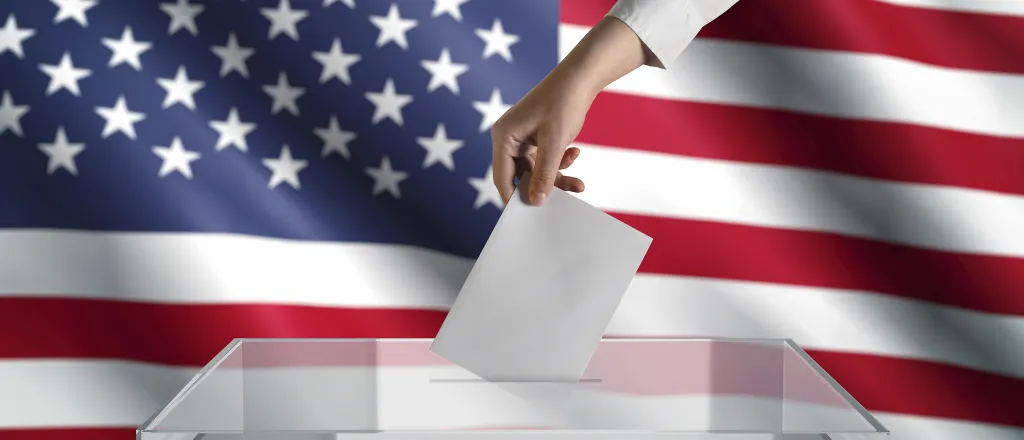
The midterm ballot measure battles have already begun
© iStock - sefa ouzel
When Missouri Republican lawmakers approved a new district map in September to help their party in Congress, progressive activist Richard von Glahn was ready. Hours after the state legislature passed the gerrymandered map, von Glahn had submitted a proposed ballot petition to put it to the voters.
It would be more than a month before the Republican-controlled secretary of state’s office approved the petition, squeezing the number of days in which Glahn’s group, People Not Politicians, has to gather signatures.
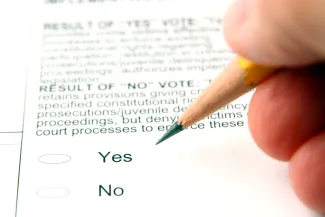
© Svanblar iStock-146069215
Missouri Republican Secretary of State Denny Hoskins argued the group couldn’t begin collecting signatures until the governor signed the map into law, two weeks after its legislative passage.
People Not Politicians is now suing Hoskins over the fate of some 90,000 signatures collected after lawmakers approved the map on Sept. 12 and before the secretary of state approved the petition on Oct. 14. The group faces a mid-December deadline to gather roughly 106,000 signatures.
A year out from the 2026 midterm elections, such legal fights and procedural maneuvering over ballot measures and referendums are already well underway in states across the country. The disputes will go a long way in determining not only what ballot measures and referendums are put before voters, but also how those questions are summarized on ballots and other official documents.
Some ballot measure campaigns argue that partisan state officials, such as secretaries of state and attorneys general, have put their thumb on the scale with misleading or inflammatory official summaries and have used arcane procedures to slow them down. More and more, campaigners say, their planning anticipates extensive litigation.
Legal challenges have also been launched against new state laws regulating citizen-led ballot measures. Critics of the regulations argue that in many cases they’re effectively restrictions, while proponents claim the rules are necessary for election integrity and to combat abuses of the ballot measure process.
Between 2018 and 2024, more than 200 lawsuits involving ballot measures were filed in state and federal courts
“Missourians have had this constitutional right for 150 years, and if the [secretary of state’s] logic holds Missourians of today and tomorrow will not have the same rights as their parents did to petition their neighbors for redress of government overreach,” von Glahn, speaking about the referendum process, told Stateline in a statement.
While many states have allowed voters to place issues on the ballot for decades, those elections have attracted significant attention in the past few years as states vote on abortion rights and other divisive issues. Between 2018 and 2024, more than 200 lawsuits involving ballot measures were filed in state and federal courts, according to data gathered by the State Democracy Research Initiative at the University of Wisconsin Law School.
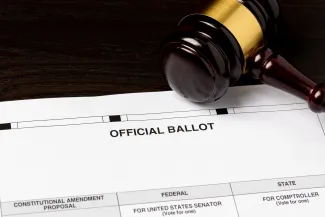
© JJ Gouin - iStock-2074087177
Even in states without a citizen-led process, state legislatures have often referred controversial measures to voters. Mid-decade congressional redistricting is emerging as the latest flash point, with California voters last week approving a ballot measure referred by state lawmakers that allows a Democratic gerrymander of the state to take effect.
Twenty-four states — including every Western state except New Mexico and Hawaii — have a citizen-led ballot measure process, according to the National Conference of State Legislatures, with 17 fairly described as Republican-leaning or swing states. Several are currently the site of pitched legal and political battles over the ballot measure process.
In Montana, the state attorney general has rewritten summaries — the language voters see on ballot measures — for proposals aimed at ensuring nonpartisan courts, prompting a lawsuit that’s pending before the state Supreme Court. Arkansas civic and campaign groups have sued to block a series of new ballot measure rules, including a requirement that canvassers ask potential petition signers for a photo ID.
Florida lawmakers passed a bill requiring ballot measure campaigns to turn in petition signatures more quickly. Oklahoma lawmakers imposed new geographic distribution requirements for signature collections. And in Utah, lawmakers voted to require campaigns to provide detailed information on how a proposal would be funded and whether it would require a new tax.
Democrats and other progressives expect upcoming state legislative sessions, many of which begin in January, to bring more measures aimed at the ballot measure process.
“Missouri is a good indicator of what we’re going to face in 2026,” said Chris Melody Fields Figueredo, executive director of the Ballot Initiative Strategy Center, which aids progressive ballot measure efforts across the country.
“And this has been true for the last several years,” she said. “One of the major tactics that those who are opposed to direct democracy — they go after the signature-gathering process to invalidate legitimate signatures, to prevent issues that voters want from getting onto the ballot.”
How do officials view their role?
Many Republicans defend their approach to ballot measures as necessary to ensure fairness in the process and prevent fraudulent signature collection. Some also voice concerns that state constitutions have become too easy to amend, as Democrats and progressives turn to ballot measures to enact policies such as minimum wage increases and abortion access that are often blocked in GOP-controlled statehouses.
Missouri’s secretary of state, Hoskins, has cast his approach to the People Not Politicians referendum petition as defending the state constitution from out-of-state actors.
While People Not Politicians is suing the secretary of state in Missouri court, Hoskins is suing the group in federal court. In a lawsuit brought jointly by Hoskins and Missouri Republican Attorney General Catherine Hanaway, Hoskins argues that under the U.S. Constitution, the power to draw congressional maps rests with the state legislature.
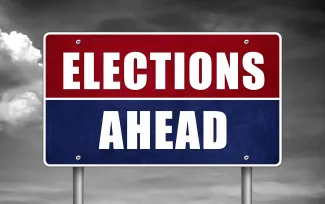
“Missouri’s Constitution belongs to Missourians, not to dark-money groups trying to rewrite it for their own gain,” Hoskins said in an October news release when the federal lawsuit was filed.
“It has become far too easy to mislead voters and undermine the sacred document that protects our way of life. Our job is to defend the rule of law, safeguard Missouri values, and make sure our Constitution cannot be bought or manipulated from the outside.”
Chuck Hatfield, a Missouri attorney who has long worked on litigation related to ballot measures in the state, said secretaries of state have historically viewed their role as ministerial.
“You’re supposed to move paperwork from the left side of the desk to the right side of the desk,” he said.
“I don’t think this secretary of state sees his role that way,” said Hatfield, who is one of the lawyers representing People Not Politicians in its lawsuit against Hoskins. “I think he sees himself as more of an advocate.”
Hoskins’ more aggressive stance toward ballot measures echoes the posture of Montana Attorney General Austin Knudsen, a Republican who this year has rewritten the ballot language of proposals concerning state courts despite finding the measures met legal requirements.
Montanans for Fair and Impartial Judges and Montanans for Nonpartisan Courts are both proposing similar measures to require nonpartisan judicial elections. Judicial elections have been nonpartisan in Montana since the 1930s, but the groups want to codify the practice in the state constitution.
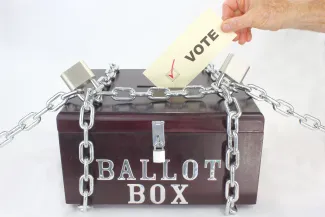
Knudsen rewrote the ballot language of the measures to emphasize that nonpartisan elections also prohibit political party labels “including labels like independent.” The two groups say the phrase suggests independent candidates can’t run in judicial elections and have filed lawsuits challenging the rewrites.
Knudsen’s office didn’t respond to an interview request. But Amanda Braynack, Knudsen’s communications director, has previously called the lawsuits frivolous. “Liberal activists appear to be worried that Montanans will see the facts of what makes an election nonpartisan rather than their own opinion on the ballot,” Braynack told the Flathead Beacon in October.
Caitie Butler, a spokesperson for Montanans for Nonpartisan Courts, said state law does give the attorney general leeway to rewrite ballot language if it’s clearly biased or argumentative, but she emphasized that the group believes its language was neither. She called ballot language rewrites a “growing challenge” in Montana over the past couple of election cycles.
Election Reformers Network, a nonpartisan group that advocates for the impartial administration of U.S. elections, in a January 2025 report said that in 85 percent of states with a citizen-led ballot measure process, a single party controlled the governorship and both chambers of the state legislature — with 13 Republican trifectas and nine Democratic trifectas in those states.
In recent years, voters in both Republican- and Democratic-leaning states had approved ballot measures with policies opposed by lawmakers, the report found. Examples included a 2020 Colorado vote that lowered tax rates, a 2024 California vote increasing certain criminal penalties, a 2020 Oklahoma vote to expand Medicaid, and a 2020 Florida vote to raise the minimum wage, among others.
The report highlighted the role of partisan state officials in the ballot measure process. In every state with citizen-led ballot measures, partisan officials play a role in reviewing and drafting ballot language. In nearly 60 percent of states, they also play a role in signature verification.
“There are definitely elements of our system that allow for partisan manipulation of elections in very different domains than in the polling station or around mail ballots, but instead in the domains that control options voters have,” Kevin Johnson, co-founder and executive director of Election Reformers Network, said in an interview.
Tighter rules
State legislatures can also exercise significant influence over the ballot measure process by setting rules that make qualifying proposals for the ballot either more or less difficult.
Arkansas lawmakers earlier this year approved a series of measures tightening requirements surrounding ballot measure proposals and gathering signatures. Under the new laws, canvassers must inform potential signers that petition fraud is a criminal offense and request photo ID from potential signers.
Potential signers must also now read a petition’s ballot title or have it read to them. And ballot titles must not be written above an eighth grade reading level.
“These bills are not restrictive. What these bills are is they provide safeguards or guardrails, and the reason you need guardrails is because there have been plenty of accidents along the way,” Arkansas state Senator Kim Hammer, a Republican, said during floor debate in February.
Hammer, a candidate for Arkansas secretary of state and the lead sponsor of some of the bills, didn’t respond to a request for comment. He said on the Senate floor that he rejected the idea that the measures were taking away the rights of the people, but that they are intended to address increasing “outside interference” in the ballot measure process.
The League of Women Voters of Arkansas and several ballot measure campaign groups have sued in federal court to block the new laws. A judge held a hearing in late September but hasn’t yet ruled on whether to grant a temporary restraining order and preliminary injunction against the requirements as the lawsuit plays out.
In Missouri, a state court trial in People Not Politicians’ lawsuit against Hoskins over its referendum petition signatures was abruptly postponed last week because the judge was ill. A new hearing is scheduled for Wednesday, though it’s not clear when the judge will rule.
People Not Politicians can almost certainly block the gerrymander for the 2026 election if the group collects enough valid signatures by a Dec. 11 deadline outlined in state law. A successful referendum petition will place the map before voters in November 2026, and Missouri would be prohibited from using the redrawn lines in the meantime.
Nov. 5, People Not Politicians announced it had collected more than 200,000 signatures — or roughly double the minimum number it needs.




